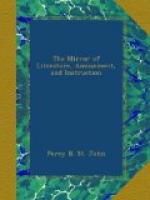At page 34, Vidocq awards to our metropolis, no very desirable distinction—
Town and Country Thieves.
“No capital in the world, London excepted, has within it so many thieves as Paris. The pavement of the modern Lutetia is incessantly trodden by rogues. It is not surprising; for the facility of hiding them in the crowd makes all that are badly disposed resort thither, whether French or foreign. The greater number are fixed constantly in this vast city; some only come like birds of passage, at the approach of great occasions, or during the summer season. Besides these exotics, there are indigenous plants, which make a fraction in the population, of which the denominator is tolerably high. I leave to the great calculator, M. Charles Dupin, the task of enumerating them in decimals, and telling us if the sum that it amounts to should not be taken into consideration in the application of the black list.”
False Keys.
“Cambrioleurs are plunderers of rooms, either by force or with false keys. There are of this class thieves of incredible effrontery; that of one Beaumont almost surpasses belief. Escaped from the Bagne at Rochefort, where he was sentenced to pass twelve years of his life, he came to Paris, and scarcely had he arrived there, where he had already practised, when, by way of getting his hand in, he committed several trifling robberies, and when by these preliminary steps he had proceeded to exploits more worthy of his ancient renown, he conceived the project of stealing a treasure. No one will imagine that this treasure was that of the Bureau Central (Central Office), now the Prefecture of Police! It was already pretty difficult to procure impressions of the keys, but he achieved this first difficulty, and soon had in his possession all the means of effecting an opening; but to open was nothing, it was necessary to open without being perceived, to introduce himself without fear of being disturbed, to work without witnesses, and go out again freely. Beaumont, who had calculated all the difficulties that opposed him, was not dismayed. He had remarked that the private room of the chief officer, M. Henri, was nigh to the spot where he proposed to effect his entrance; he espied the propitious moment, and wished sincerely that some circumstance would call away so dangerous a neighbour for some time, and chance was subservient to his wishes.”




